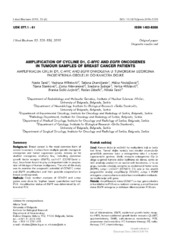Приказ основних података о документу
Amplification of Cycline D1, C-Myc and Egfr Oncogenes in Tumour Samples of Breast Cancer Patients
| dc.creator | Tanić, Nasta | |
| dc.creator | Milinković, Vedrana | |
| dc.creator | Dramićanin, Tatjana | |
| dc.creator | Nedeljković, Milica | |
| dc.creator | Stanković, Tijana | |
| dc.creator | Milovanović, Zorka M. | |
| dc.creator | Šušnjar, Snežana | |
| dc.creator | Milošević, Verica | |
| dc.creator | Šošić-Jurjević, Branka | |
| dc.creator | Džodić, Radan R. | |
| dc.creator | Tanić, Nikola | |
| dc.date.accessioned | 2018-03-01T23:47:00Z | |
| dc.date.available | 2018-03-01T23:47:00Z | |
| dc.date.issued | 2013 | |
| dc.identifier.issn | 1452-8258 | |
| dc.identifier.issn | 1452-8266 | |
| dc.identifier.uri | https://vinar.vin.bg.ac.rs/handle/123456789/5745 | |
| dc.description.abstract | Background: Breast cancer is the most common form of cancer in women. It arises from multiple genetic changes in oncogenes and tumor suppressor genes. Among so far studied oncogenes relatively few, including epdermal growth factor receptor (EGFR), cyclinD1 (CCND1) and c-myc, have been found to play an important role in progression of this type of human malignancy. The aim of this study was to examine the prognostic potential of CCND1, c-myc and EGFR amplification and their possible cooperation in breast carcinogenesis. Methods: Copy number analyses of CCND1 and c-myc genes were done by TaqMan based quantitative real time PCR. Amplification status of EGFR was determined by differential PCR. Results: Amplification of CCND1, c-myc and EGFR oncogene has been found in 20.4%, 26.5% and 26.5% of breast cancer cases, respectively. Analysis showed that amplification of CCND1 oncogene was significantly associated with the stage II of disease while amplification of EGFR gene was significantly associated with overexpression of HER-2/neu. Tumour stage and expression of HER-2/neu appeared to be significant predictors of patients outcome. Stage I patients lived significantly longer then stage III patients (p=0.04) while patients with HER-2/neu overexpression had worse prognoses and lived significantly shorter (p=0.001). Finally, survival of patients who underwent hormone therapy only was significantly longer (p=0.001) then survival of the rest of patients. Conclusions: Amplification of CCND1 or EGFR oncogene is associated with the progression of breast cancer and bad prognosis. No co-ordination in amplification of CCND1, c-myc and EGFR oncogenes were established in this cohort of breast cancer patients. | en |
| dc.relation | info:eu-repo/grantAgreement/MESTD/Integrated and Interdisciplinary Research (IIR or III)/41031/RS// | |
| dc.relation | info:eu-repo/grantAgreement/MESTD/Basic Research (BR or ON)/173049/RS// | |
| dc.rights | openAccess | en |
| dc.source | Journal of Medical Biochemistry | en |
| dc.subject | breast cancer | en |
| dc.subject | oncogenes | en |
| dc.subject | cycline D1 | en |
| dc.subject | c-myc | en |
| dc.subject | EGFR | en |
| dc.title | Amplification of Cycline D1, C-Myc and Egfr Oncogenes in Tumour Samples of Breast Cancer Patients | en |
| dc.type | article | en |
| dcterms.abstract | Драмићанин Татјана; Таниц, Никола; Дзодиц, Радан; Сосиц-Јурјевиц, Бранка; Милосевиц, Верица; Сусњар, Снезана; Миловановиц, Зорка; Станковиц, Тијана; Недељковиц, Милица; Милинковиц, Ведрана; Таниц, Наста; | |
| dc.citation.volume | 32 | |
| dc.citation.issue | 4 | |
| dc.identifier.wos | 000326577800001 | |
| dc.identifier.doi | 10.2478/jomb-2014-0005 | |
| dc.citation.rank | M23 | |
| dc.identifier.scopus | 2-s2.0-84887493187 | |
| dc.identifier.fulltext | https://vinar.vin.bg.ac.rs//bitstream/id/13533/5741.pdf |

